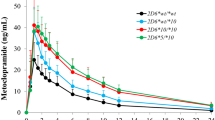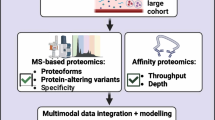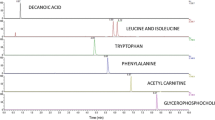Abstract
Background and Objective
Phenotyping cocktails use a combination of cytochrome P450 (CYP)-specific probe drugs to simultaneously assess the activity of different CYP isoforms. To improve the clinical applicability of CYP phenotyping, the main objectives of this study were to develop a new cocktail based on probe drugs that are widely used in clinical practice and to test whether alternative sampling methods such as collection of dried blood spots (DBS) or saliva could be used to simplify the sampling process.
Methods
In a randomized crossover study, a new combination of commercially available probe drugs (the Basel cocktail) was tested for simultaneous phenotyping of CYP1A2, CYP2B6, CYP2C9, CYP2C19, CYP2D6 and CYP3A4. Sixteen subjects received low doses of caffeine, efavirenz, losartan, omeprazole, metoprolol and midazolam in different combinations. All subjects were genotyped, and full pharmacokinetic profiles of the probe drugs and their main metabolites were determined in plasma, dried blood spots and saliva samples.
Results
The Basel cocktail was well tolerated, and bioequivalence tests showed no evidence of mutual interactions between the probe drugs. In plasma, single timepoint metabolic ratios at 2 h (for CYP2C19 and CYP3A4) or at 8 h (for the other isoforms) after dosing showed high correlations with corresponding area under the concentration–time curve (AUC) ratios (AUC0–24h parent/AUC0–24h metabolite) and are proposed as simple phenotyping metrics. Metabolic ratios in dried blood spots (for CYP1A2 and CYP2C19) or in saliva samples (for CYP1A2) were comparable to plasma ratios and offer the option of minimally invasive or non-invasive phenotyping of these isoforms.
Conclusions
This new combination of phenotyping probe drugs can be used without mutual interactions. The proposed sampling timepoints have the potential to facilitate clinical application of phenotyping but require further validation in conditions of altered CYP activity. The use of DBS or saliva samples seems feasible for phenotyping of the selected CYP isoforms.



Similar content being viewed by others
References
Wilkinson GR. Drug metabolism and variability among patients in drug response. N Engl J Med. 2005;352(21):2211–21 (Epub 2005/05/27).
Setiabudy R, Kusaka M, Chiba K, Darmansjah I, Ishizaki T. Dapsone N-acetylation, metoprolol alpha-hydroxylation, and S-mephenytoin 4-hydroxylation polymorphisms in an Indonesian population: a cocktail and extended phenotyping assessment trial. Clin Pharmacol Ther. 1994;56(2):142–53 (Epub 1994/08/01).
Frye RF, Matzke GR, Adedoyin A, Porter JA, Branch RA. Validation of the five-drug “Pittsburgh cocktail” approach for assessment of selective regulation of drug-metabolizing enzymes. Clin Pharmacol Ther. 1997;62(4):365–76 (Epub 1997/11/14).
Zhu B, Ou-Yang DS, Chen XP, Huang SL, Tan ZR, He N, et al. Assessment of cytochrome P450 activity by a five-drug cocktail approach. Clin Pharmacol Ther. 2001;70(5):455–61 (Epub 2001/11/24).
Chainuvati S, Nafziger AN, Leeder JS, Gaedigk A, Kearns GL, Sellers E, et al. Combined phenotypic assessment of cytochrome p450 1A2, 2C9, 2C19, 2D6, and 3A, N-acetyltransferase-2, and xanthine oxidase activities with the “Cooperstown 5 + 1 cocktail”. Clin Pharmacol Ther. 2003;74(5):437–47 (Epub 2003/10/31).
Christensen M, Andersson K, Dalen P, Mirghani RA, Muirhead GJ, Nordmark A, et al. The Karolinska cocktail for phenotyping of five human cytochrome P450 enzymes. Clin Pharmacol Ther. 2003;73(6):517–28 (Epub 2003/06/18).
Blakey GE, Lockton JA, Perrett J, Norwood P, Russell M, Aherne Z, et al. Pharmacokinetic and pharmacodynamic assessment of a five-probe metabolic cocktail for CYPs 1A2, 3A4, 2C9, 2D6 and 2E1. Brit J Clin Pharmacol. 2004;57(2):162–9 (Epub 2004/01/30).
Sharma A, Pilote S, Belanger PM, Arsenault M, Hamelin BA. A convenient five-drug cocktail for the assessment of major drug metabolizing enzymes: a pilot study. Brit J Clin Pharmacol. 2004;58(3):288–97 (Epub 2004/08/26).
Krosser S, Neugebauer R, Dolgos H, Fluck M, Rost KL, Kovar A. Investigation of sarizotan’s impact on the pharmacokinetics of probe drugs for major cytochrome P450 isoenzymes: a combined cocktail trial. Eur J Clin Pharmacol. 2006;62(4):277–84 (Epub 2006/03/10).
Fuhr U, Jetter A, Kirchheiner J. Appropriate phenotyping procedures for drug metabolizing enzymes and transporters in humans and their simultaneous use in the “cocktail” approach. Clin Pharmacol Ther. 2007;81(2):270–83 (Epub 2007/01/30).
Ryu JY, Song IS, Sunwoo YE, Shon JH, Liu KH, Cha IJ, et al. Development of the “Inje cocktail” for high-throughput evaluation of five human cytochrome P450 isoforms in vivo. Clin Pharmacol Ther. 2007;82(5):531–40 (Epub 2007/03/30).
Tomalik-Scharte D, Jetter A, Kinzig-Schippers M, Skott A, Sorgel F, Klaassen T, et al. Effect of propiverine on cytochrome P450 enzymes: a cocktail interaction study in healthy volunteers. Drug Metab Dispos Biol Fate Chem. 2005;33(12):1859–66 (Epub 2005/09/27).
Wohlfarth A, Naue J, Lutz-Bonengel S, Dresen S, Auwarter V. Cocktail approach for in vivo phenotyping of 5 major CYP450 isoenzymes: development of an effective sampling, extraction, and analytical procedure and pilot study with comparative genotyping. J Clin Pharmacol. 2012;52(8):1200–14 (Epub 2011/09/03).
Videau O, Delaforge M, Levi M, Thevenot E, Gal O, Becquemont L, et al. Biochemical and analytical development of the CIME cocktail for drug fate assessment in humans. Rapid Commun Mass Spectrom RCM. 2010;24(16):2407–19 (Epub 2010/07/27).
Wang Z, Gorski JC, Hamman MA, Huang SM, Lesko LJ, Hall SD. The effects of St John’s wort (Hypericum perforatum) on human cytochrome P450 activity. Clin Pharmacol Ther. 2001;70(4):317–26 (Epub 2001/10/24).
Scott RJ, Palmer J, Lewis IA, Pleasance S. Determination of a ‘GW cocktail’ of cytochrome P450 probe substrates and their metabolites in plasma and urine using automated solid phase extraction and fast gradient liquid chromatography tandem mass spectrometry. Rapid Commun Mass Spectrom RCM. 1999;13(23):2305–19 (Epub 1999/11/24).
Yin OQ, Lam SS, Lo CM, Chow MS. Rapid determination of five probe drugs and their metabolites in human plasma and urine by liquid chromatography/tandem mass spectrometry: application to cytochrome P450 phenotyping studies. Rapid Commun Mass Spectrom RCM. 2004;18(23):2921–33 (Epub 2004/11/06).
Gass RJ, Gal J, Fogle PW, Detmar-Hanna D, Gerber JG. Neither dapsone hydroxylation nor cortisol 6beta-hydroxylation detects the inhibition of CYP3A4 by HIV-1 protease inhibitors. Eur J Clin Pharmacol. 1998;54(9–10):741–7 (Epub 1999/01/29).
Hauschke D, Kieser M, Diletti E, Burke M. Sample size determination for proving equivalence based on the ratio of two means for normally distributed data. Stat Med. 1999;18(1):93–105 (Epub 1999/02/17).
Hauschke D, Steinijans VW, Diletti E, Burke M. Sample size determination for bioequivalence assessment using a multiplicative model. J Pharmacokinet Biopharmaceut. 1992;20(5):557–61 Epub 1992/10/01.
Cayan F, Ayaz L, Aban M, Dilek S, Gumus LT. Role of CYP2C19 polymorphisms in patients with endometriosis. Gynecol Endocrinol Off J Int Soc Gynecol Endocrinol. 2009;25(8):530–5 (Epub 2009/06/06).
de Morais SM, Wilkinson GR, Blaisdell J, Nakamura K, Meyer UA, Goldstein JA. The major genetic defect responsible for the polymorphism of S-mephenytoin metabolism in humans. J Biol Chem. 1994;269(22):15419–22 (Epub 1994/06/03).
Savino M, Seripa D, Gallo AP, Garrubba M, D’Onofrio G, Bizzarro A, et al. Effectiveness of a high-throughput genetic analysis in the identification of responders/non-responders to CYP2D6-metabolized drugs. Clin Lab. 2011;57(11–12):887–93 (Epub 2012/01/14).
US Department of Health and Human Services, Food and Drug Administration, Center for Drug Evaluation and Research (CDER). Guidance for Industry. Drug interaction studies—study design, data analysis, implications for dosing, and labeling recommendations. Silver Spring: CDER, 2012.
Ward BA, Gorski JC, Jones DR, Hall SD, Flockhart DA, Desta Z. The cytochrome P450 2B6 (CYP2B6) is the main catalyst of efavirenz primary and secondary metabolism: implication for HIV/AIDS therapy and utility of efavirenz as a substrate marker of CYP2B6 catalytic activity. J Pharmacol Exp Ther. 2003;306(1):287–300 (Epub 2003/04/05).
Rotger M, Tegude H, Colombo S, Cavassini M, Furrer H, Decosterd L, et al. Predictive value of known and novel alleles of CYP2B6 for efavirenz plasma concentrations in HIV-infected individuals. Clin Pharmacol Ther. 2007;81(4):557–66 (Epub 2007/01/20).
Rotger M, Colombo S, Furrer H, Bleiber G, Buclin T, Lee BL, et al. Influence of CYP2B6 polymorphism on plasma and intracellular concentrations and toxicity of efavirenz and nevirapine in HIV-infected patients. Pharmacogenet Genom. 2005;15(1):1–5 (Epub 2005/05/03).
von Moltke LL, Greenblatt DJ, Granda BW, Giancarlo GM, Duan SX, Daily JP, et al. Inhibition of human cytochrome P450 isoforms by nonnucleoside reverse transcriptase inhibitors. J Clin Pharmacol. 2001;41(1):85–91 (Epub 2001/02/28).
Otton SV, Crewe HK, Lennard MS, Tucker GT, Woods HF. Use of quinidine inhibition to define the role of the sparteine/debrisoquine cytochrome P450 in metoprolol oxidation by human liver microsomes. J Pharmacol Exp Ther. 1988;247(1):242–7 (Epub 1988/10/01).
McGourty JC, Silas JH, Lennard MS, Tucker GT, Woods HF. Metoprolol metabolism and debrisoquine oxidation polymorphism–population and family studies. Brit J Clin Pharmacol. 1985;20(6):555–66 (Epub 1985/12/01).
Sohn DR, Kusaka M, Shin SG, Jang IJ, Chiba K, Ishizaki T. Utility of a one-point (3-hour postdose) plasma metabolic ratio as a phenotyping test using metoprolol in two East Asian populations. Ther Drug Monit. 1992;14(3):184–9 (Epub 1992/06/01).
Tamminga WJ, Wemer J, Oosterhuis B, Brakenhoff JP, Gerrits MG, de Zeeuw RA, et al. An optimized methodology for combined phenotyping and genotyping on CYP2D6 and CYP2C19. Eur J Clin Pharmacol. 2001;57(2):143–6 (Epub 2001/06/22).
Fux R, Morike K, Prohmer AM, Delabar U, Schwab M, Schaeffeler E, et al. Impact of CYP2D6 genotype on adverse effects during treatment with metoprolol: a prospective clinical study. Clin Pharmacol Ther. 2005;78(4):378–87 (Epub 2005/10/04).
Yasar U, Dahl ML, Christensen M, Eliasson E. Intra-individual variability in urinary losartan oxidation ratio, an in vivo marker of CYP2C9 activity. Brit J Clin Pharmacol. 2002;54(2):183–5 (Epub 2002/09/05).
Yasar U, Forslund-Bergengren C, Tybring G, Dorado P, Llerena A, Sjoqvist F, et al. Pharmacokinetics of losartan and its metabolite E-3174 in relation to the CYP2C9 genotype. Clin Pharmacol Ther. 2002;71(1):89–98 (Epub 2002/02/02).
Babaoglu MO, Yasar U, Sandberg M, Eliasson E, Dahl ML, Kayaalp SO, et al. CYP2C9 genetic variants and losartan oxidation in a Turkish population. Eur J Clin Pharmacol. 2004;60(5):337–42 (Epub 2004/06/16).
Kaukonen KM, Olkkola KT, Neuvonen PJ. Fluconazole but not itraconazole decreases the metabolism of losartan to E-3174. Eur J Clin Pharmacol. 1998;53(6):445–9 (Epub 1998/04/29).
Christ DD, Wong PC, Wong YN, Hart SD, Quon CY, Lam GN. The pharmacokinetics and pharmacodynamics of the angiotensin II receptor antagonist losartan potassium (DuP 753/MK 954) in the dog. J Pharmacol Exp Ther. 1994;268(3):1199–205 (Epub 1994/03/01).
de Boer T, Wieling J, Meulman E, Reuvers M, Renkema G, den Daas I, et al. Application of dried blood spot sampling combined with LC-MS/MS for genotyping and phenotyping of CYP450 enzymes in healthy volunteers. Biomed Chromatogr BMC. 2011;25(10):1112–23 (Epub 2011/02/03).
Daali Y, Samer C, Deglon J, Thomas A, Chabert J, Rebsamen M, et al. Oral flurbiprofen metabolic ratio assessment using a single-point dried blood spot. Clin Pharmacol Ther. 2012;91(3):489–96 (Epub 2012/01/13).
Link B, Haschke M, Grignaschi N, Bodmer M, Aschmann YZ, Wenk M, et al. Pharmacokinetics of intravenous and oral midazolam in plasma and saliva in humans: usefulness of saliva as matrix for CYP3A phenotyping. Brit J Clin Pharmacol. 2008;66(4):473–84 (Epub 2008/06/10).
Idkaidek N, Arafat T. Saliva versus plasma pharmacokinetics: theory and application of a salivary excretion classification system. Mol Pharm. 2012;9(8):2358–2363. doi:10.1021/mp300250r.
Dawes CP, Kendall MJ, John VA. Comparison of plasma and saliva levels of metoprolol and oxprenolol. Brit J Clin Pharmacol. 1978;5(3):217–21 (Epub 1978/03/01).
Acknowledgments
The authors thank Claudia Blasi and Luisa Baselgia for their assistance with the clinical study, and Beatrice Vetter for technical assistance.
Author Contributions
Massimiliano Donzelli, contributed to the study design, data analysis and drafting of the manuscript. Adrian Derungs contributed to the study design, conduct of the study and data analysis. Lana Nezic contributed to the conduct of the study. Maria-Giovanna Serratore contributed to the analytical tools and data analysis. Christoph Noppen contributed to the analytical tools and data analysis. Stephan Krähenbühl contributed to the study design and data analysis. Manuel Haschke contributed to the study design, data analysis and drafting of the manuscript.
Disclosures
This study was financed by the Division of Clinical Pharmacology & Toxicology, University Hospital Basel (Basel, Switzerland).
Conflicts of Interest
The authors have no conflicts of interest that are directly relevant to the content of this article.
Author information
Authors and Affiliations
Corresponding author
Additional information
M. Donzelli and A. Derungs contributed equally to this work.
ClinicalTrials.gov ID: NCT01187862.
Electronic Supplementary Material
Below is the link to the Electronic Supplementary Material.
Rights and permissions
About this article
Cite this article
Donzelli, M., Derungs, A., Serratore, MG. et al. The Basel Cocktail for Simultaneous Phenotyping of Human Cytochrome P450 Isoforms in Plasma, Saliva and Dried Blood Spots. Clin Pharmacokinet 53, 271–282 (2014). https://doi.org/10.1007/s40262-013-0115-0
Published:
Issue Date:
DOI: https://doi.org/10.1007/s40262-013-0115-0




